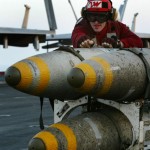Tuesday
Jan122010
Middle East Arms Triangle: The US, "Moderate" Arabs, & Israel
 Tuesday, January 12, 2010 at 6:23
Tuesday, January 12, 2010 at 6:23  On 6 January, we reported that the Netanyahu government had concerns over Washington's sale of about $6 billion of arms to four "moderate" Arab states (Egypt, Saudi Arabia, Jordan, and the United Arab Emirates) and Washington. We asked whether the Israelis were pursuing the complaint to argue the argument that the regional balance of power would collapse because of the arms shipments, regardless of how "moderate" the Arabs states are.
On 6 January, we reported that the Netanyahu government had concerns over Washington's sale of about $6 billion of arms to four "moderate" Arab states (Egypt, Saudi Arabia, Jordan, and the United Arab Emirates) and Washington. We asked whether the Israelis were pursuing the complaint to argue the argument that the regional balance of power would collapse because of the arms shipments, regardless of how "moderate" the Arabs states are.The background to the current manoeuvres lies in Israel's concerns over a $20 billion arms deal between Saudi Arabia and the George W. Bush Administration. On that occasion, Tel Aviv used its concerns as leverage to receive advanced F-35 fighter jets and to limit American arms sales to Lebanon amidst the re-emergence of Hezbollah. So far, no arms deal with Israel have been signed under Obama, and there is the issue of shipment of higher-tech arms under the 2007 Memorandum of Understanding, which promised $30 billion to Tel Aviv over the following 10 years.
In that context, perhaps the immediate postures over the US-Arab deals should situated under the US-Israel strategic relationship. The Jewish Daily Forward has noted:
Leaders in Washington and Jerusalem have publicly locked horns over the issue of West Bank settlements. And Israeli public opinion has largely viewed America’s new administration as unfriendly. But behind the scenes, strategic security relations between the two countries are flourishing.

 According to Haaretz, major arms deals signed between U.S.A and Egypt, Saudi Arabia, Jordan and the United Arab Emirates
According to Haaretz, major arms deals signed between U.S.A and Egypt, Saudi Arabia, Jordan and the United Arab Emirates